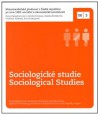Předkládaný projekt si klade za cíl zmapovat situaci neprovdaných matek po roce 1989 s důrazem na sociální a regionální aspekt problematiky a navrhnout a zhodnotit případné nástroje sociální politiky na základě zahraničních zkušeností. Doplní tak demografické práce, které upozorňují na to, že se v českém případě nemanželská plodnost kumuluje mezi mladými ženami s nízkým a velmi nízkým vzděláním
Po roce 1989 v české společnosti vzrostly podíly neúplných rodin, ale především se prudce zvýšily počty svobodných matek a v současné době se rodí přibližně 30 % dětí neprovdaným ženám. I když porození dítěte neprovdanou ženou nemusí samo o sobě vypovídat o sociální marginalizaci, v mnoha případech tomu tak je. O typu a relativní rizikovosti svobodného mateřství vypovídají dva faktory: 1) jaké je typické sociální postavení neprovdaných matek; 2) kolik z neprovdaných matek žije v de fakto manželstvích.
Navrhovaný projekt počítá s uskutečněním empirického výzkumu, jehož cílem je zjistit, zda otcové dětí neprovdaných matek obvykle žijí ve stejné domácnosti a nakolik lze nárůst mimomanželské plodnosti vysvětlit rostoucí popularitou nesezdaných soužití. Výzkum se bude rovněž zaměřovat na otázku, zda a v jaké formě se muži zapojují do výchovy dětí a umožní srovnání rodin manželských a ostatních domácností s dětmi. Tímto způsobem se získá jedinečná informace o tom, jaký podíl mimomanželské plodnosti představují svobodné matky v tradičním smyslu slova, jaký je podíl neprovdaných matek žijících ve faktických manželstvích a jaká je sociální situace neprovdaných matek.
Publikace vydané v rámci projektu (celkem 36, zobrazeno 21 - 30)
Texts in the bulletin provide the reader with various perspectives of unmarried mothers. In the fist part of the publication we find the summary of the demographic development of the non-marital fertility as well as the principal results of multilevel modelling. The second part presents more detailed picture of the social situation of unmarried mothers drawn on the results from specialized survey of mothers.
The aim of this study is to outline main perspectives of current research and theorizing on housework. In the first part the reasons of problematic status of housework in modern society are investigated. In the second part economic and social-constructionist approaches to the explanation of the division of housework are distinguished. The first approach focus on economic rationality and comparison of resources, the second focus on gender ideology and confirmation of gender identity.
This article examines whether there are any differences in the way in which married couples and unmarried cohabitating couples manage their incomes.Using data from the ISSP 1994 and the ISSP 2002 the author attempts to answer the question of whether over the course of the 1990s in the CR the character of unmarried cohabitation changed, and whether the economic arrangements of unmarried couples with children resemble those of married couples.
This paper, based on data from survey Social and economic condition of motherhood 2006, examines on micro-level reasons, by which unwed mothers have explained their family situation at the childbirth. In the first part three types of motivation of non-marital motherhood are identified: absence/disapproval of partner, liberal orientation and pragmatic (economic) motivation.
The aim of this paper is to compare the division of housework and the perceptions of its fairness in seven European countries based on data from ISSP 2002. The main focus is given on the relation of the perceived fairness of the proportional share of housework and time investments into housework and particularly to differences according to the character of involvement into economic activity of both partners.
The article describes character of activities and thematic areas of Czech non-profit organizations that focus on promoting gender equality and women’s rights in 1990s. Beside the women’s organizations the attention is paid to identify the other projects aimed at supporting women or gender equality, but addressed by non-profit organizations whose main object of activity is broader.
The article focuses on the Czech social system and primarily on the measures and benefits aimed to help single mothers. Through an analysis of the social welfare payment system the author tries to define if, and under what conditions, it is more profitable for mothers to be married rather than unmarried.
The article discusses in detail policies of maternity leave in several European countries. The prime focus is on the length and conditions of maternity leave and the amount of compensation paid through the maternity benefit. The outcome is a scale of all the countries based on a variable that combines the effects of both the amount of a monthly compensation in relation to the average income and the amount of maternity benefit paid during the whole course of maternity leave.


Newsletter
Facebook
X
Tweets by SociologickyNewsletter